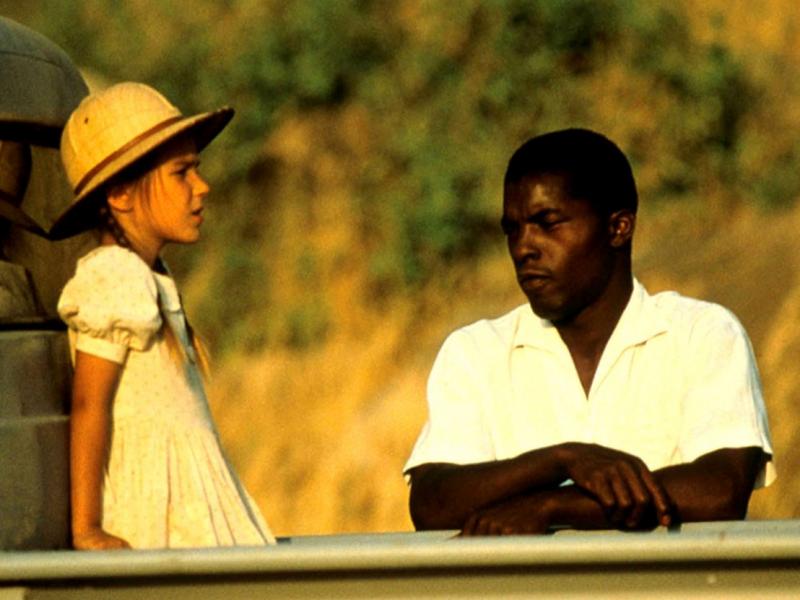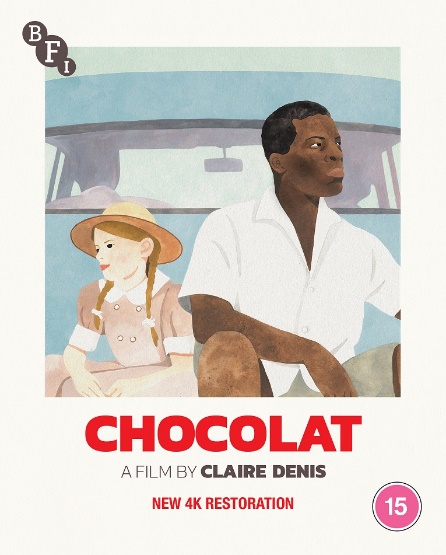Blu-ray: Chocolat | reviews, news & interviews
Blu-ray: Chocolat
Blu-ray: Chocolat
Claire Denis' African debut is a nostalgic yet unsparing look at colonial life

Claire Denis’ 1988 debut is a sensual madeleine to her Cameroonian childhood, with its taste of termites on butter, sound of birdsong and insect chitter, and the camera’s slow turn and rise into vast vistas. It’s also a colonial reckoning, setting out themes of violent incomprehension and fractured souls. Like the gaze of France (Cécile Ducasse), her child surrogate in this 1957 tale, Denis’ initial African vision is enigmatic and unblinking.
 Chocolat is framed by the adult France (Mireille Périer, pictured below), returning to Eighties Cameroon to seek her old colonial home. Modern buildings flit by and become remembered huts, a temporal transition carried by the great South African jazz pianist Abdullah Ibrahim’s warmly propulsive score, in a giddy rush of nostalgia. Robert Alazraki’s cinematography, now 4K-restored, catches the heat and light which makes exiles ache. And yet Denis probes the contradictions and fearful hatreds which make colonists' African love impossible to consummate. As she recalls in a new interview, even as a child she recognised the “abnormality” of her situation, “that it… [was] the end of something… but a great opportunity.”
Chocolat is framed by the adult France (Mireille Périer, pictured below), returning to Eighties Cameroon to seek her old colonial home. Modern buildings flit by and become remembered huts, a temporal transition carried by the great South African jazz pianist Abdullah Ibrahim’s warmly propulsive score, in a giddy rush of nostalgia. Robert Alazraki’s cinematography, now 4K-restored, catches the heat and light which makes exiles ache. And yet Denis probes the contradictions and fearful hatreds which make colonists' African love impossible to consummate. As she recalls in a new interview, even as a child she recognised the “abnormality” of her situation, “that it… [was] the end of something… but a great opportunity.”
France’s parents rule a ridiculous French outpost, with its garden and ritually raised Tricolour. District governor Marc (François Cluzet) has a dreamy tenderness for Cameroon, even as his arbitrary racial authority isolates him. His wife Aimée (Guilia Boschi) is more miserably capricious, berating their Anglo-schooled cook (“No more Yorkshire pudding!”), and simmering with attraction for their servant Protée (Isaach de Bankolé).
Chocolat’s first close-up is of black male skin, watched by the adult France, whose own white limbs are bare in the heat. Race still separates them. In the Fifties, Protée’s kind touch is reserved for secret, instructional intimacies with young France: smearing her arm with animal blood, proffering termites, playfully licking her hand. He and Aimée are heavy with racial animus, their bodies owned by Empire. Its fag-end’s brute decadence is emphasised by unwelcome French visitors: a thuggish coffee planter, ancestor of Isabelle Huppert’s plantation boss in Denis’s searingly apocalyptic, postcolonial White Material (2009), and a handsome beau whose “going native” only deepens his racist spite. Chocolat never suggests White Material’s fatal powder-keg, or the violent, homoerotic heat and sweat of Beau Travail’s Djibouti. Its Africa stays an adventurous idyll for solitary, watchful France, as it was for Denis. Protée’s fate is surely less happy, but de Bankolé ensures wounded stoicism, wit and strength pulse beneath his servility. Vivid sensations and societal crimes are both expressed with Denis' characteristic, scalpel precision.
Chocolat never suggests White Material’s fatal powder-keg, or the violent, homoerotic heat and sweat of Beau Travail’s Djibouti. Its Africa stays an adventurous idyll for solitary, watchful France, as it was for Denis. Protée’s fate is surely less happy, but de Bankolé ensures wounded stoicism, wit and strength pulse beneath his servility. Vivid sensations and societal crimes are both expressed with Denis' characteristic, scalpel precision.
Chocolat’s seed was sown as Denis location-scouted Wim Wenders’ Paris, Texas (1984), whose arid American setting seemed “the landscape of cinema”, she says today, and brought Africa to mind. Her long, high-level apprenticeship, from Bresson extra to Wenders’ assistant director, saw her working on Jim Jarmusch’s Down By Law (1986) as she prepared her debut, as this release’s new interview and a generous, detailed 2019 onstage talk both explore. “Wim is a man who would never surrender,” she says of his influence on her own fierce trajectory. “If we don’t do the film, it’s better to die.” Denis is a great presence on camera, toughly feminine, warm and flinty.
Excellent essays on Chocolat’s postcolonial threads, Denis’ career and Ibrahim’s score, commentary by critic Kate Rennebohm and Mary Martin’s 2018 animated short Childhood Memories, recalling her own Nigerian heritage, round out this release.
rating
Share this article
The future of Arts Journalism
You can stop theartsdesk.com closing!
We urgently need financing to survive. Our fundraising drive has thus far raised £49,000 but we need to reach £100,000 or we will be forced to close. Please contribute here: https://gofund.me/c3f6033d
And if you can forward this information to anyone who might assist, we’d be grateful.

Subscribe to theartsdesk.com
Thank you for continuing to read our work on theartsdesk.com. For unlimited access to every article in its entirety, including our archive of more than 15,000 pieces, we're asking for £5 per month or £40 per year. We feel it's a very good deal, and hope you do too.
To take a subscription now simply click here.
And if you're looking for that extra gift for a friend or family member, why not treat them to a theartsdesk.com gift subscription?
more Film
 Oslo Stories Trilogy: Sex review - sexual identity slips, hurts and heals
A quietly visionary series concludes with two chimney sweeps' awkward sexual liberation
Oslo Stories Trilogy: Sex review - sexual identity slips, hurts and heals
A quietly visionary series concludes with two chimney sweeps' awkward sexual liberation
 Sorry, Baby review - the healing power of friendship in the aftermath of sexual assault
Eva Victor writes, directs and stars in their endearing debut feature
Sorry, Baby review - the healing power of friendship in the aftermath of sexual assault
Eva Victor writes, directs and stars in their endearing debut feature
 Blu-ray: Who Wants to Kill Jessie?
Fast-paced and visually inventive Czech comedy
Blu-ray: Who Wants to Kill Jessie?
Fast-paced and visually inventive Czech comedy
 Oslo Stories Trilogy: Love review - freed love
Gay cruising offers straight female lessons in a heady ode to urban connection
Oslo Stories Trilogy: Love review - freed love
Gay cruising offers straight female lessons in a heady ode to urban connection
 Beating Hearts review - kiss kiss, slam slam
Romance and clobberings in a so-so French melodrama
Beating Hearts review - kiss kiss, slam slam
Romance and clobberings in a so-so French melodrama
 Materialists review - a misfiring romcom or an undercooked satire?
Writer-director Celine Song's latest can't decide what kind of film it is
Materialists review - a misfiring romcom or an undercooked satire?
Writer-director Celine Song's latest can't decide what kind of film it is
 theartsdesk Q&A: actor Leonie Benesch on playing an overburdened nurse in the Swiss drama 'Late Shift'
The Guildhall-trained German star talks about the enormous pressures placed on nurses and her admiration for British films and TV
theartsdesk Q&A: actor Leonie Benesch on playing an overburdened nurse in the Swiss drama 'Late Shift'
The Guildhall-trained German star talks about the enormous pressures placed on nurses and her admiration for British films and TV
 Freakier Friday review - body-swapping gone ballistic
Lindsay Lohan and Jamie Lee Curtis's comedy sequel jumbles up more than their daughter-mother duo
Freakier Friday review - body-swapping gone ballistic
Lindsay Lohan and Jamie Lee Curtis's comedy sequel jumbles up more than their daughter-mother duo
 Eight Postcards from Utopia review - ads from the era when 1990s Romania embraced capitalism
Radu Jude's documentary is a mad montage of cheesy TV commercials
Eight Postcards from Utopia review - ads from the era when 1990s Romania embraced capitalism
Radu Jude's documentary is a mad montage of cheesy TV commercials
 The Kingdom review - coming of age as the body count rises
A teen belatedly bonds with her mysterious dad in an unflinching Corsican mob drama
The Kingdom review - coming of age as the body count rises
A teen belatedly bonds with her mysterious dad in an unflinching Corsican mob drama
 Weapons review - suffer the children
'Barbarian' follow-up hiply riffs on ancient fears
Weapons review - suffer the children
'Barbarian' follow-up hiply riffs on ancient fears

Add comment